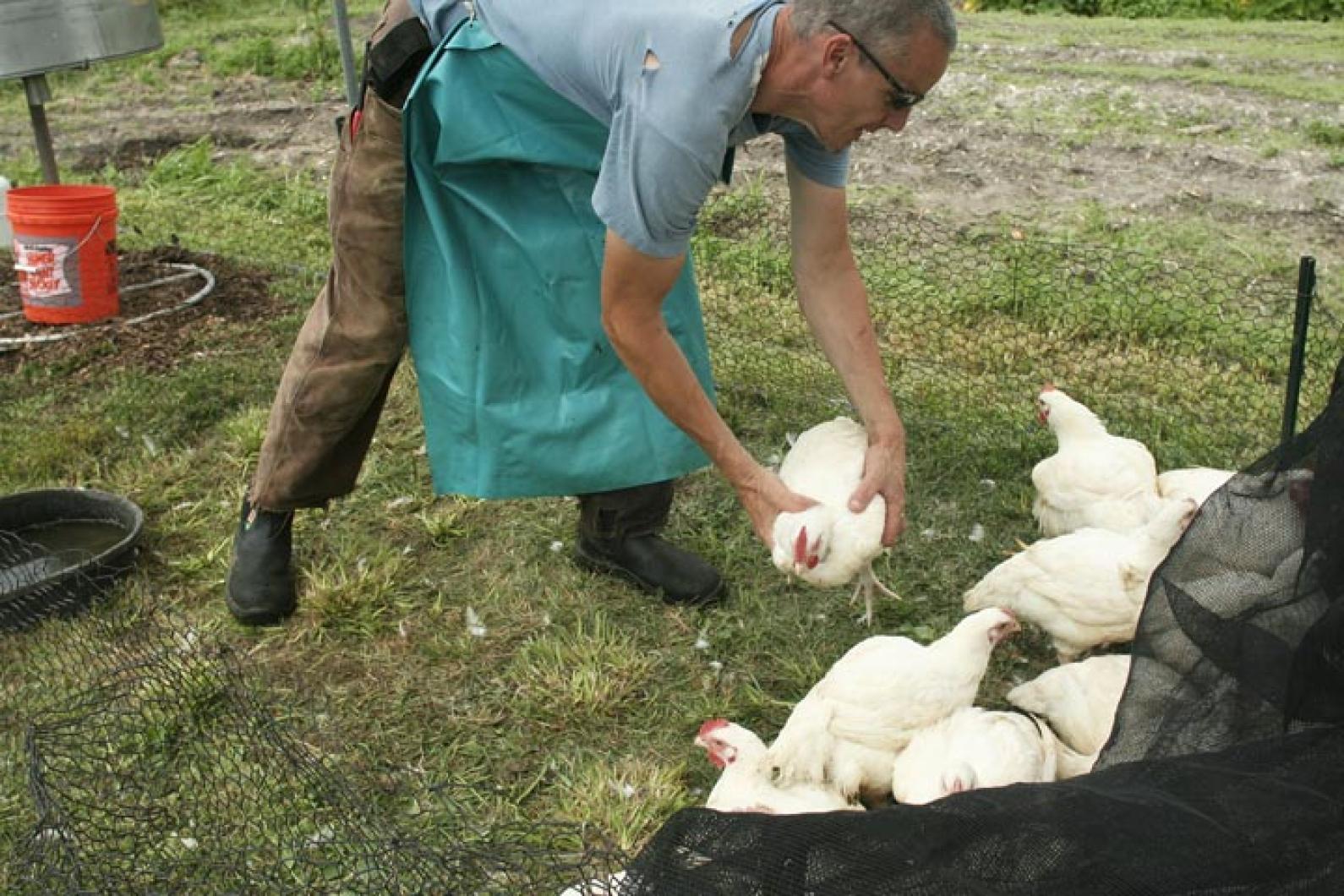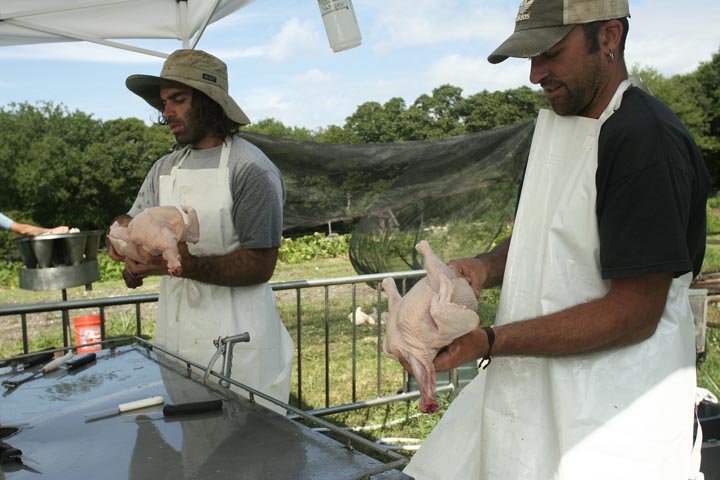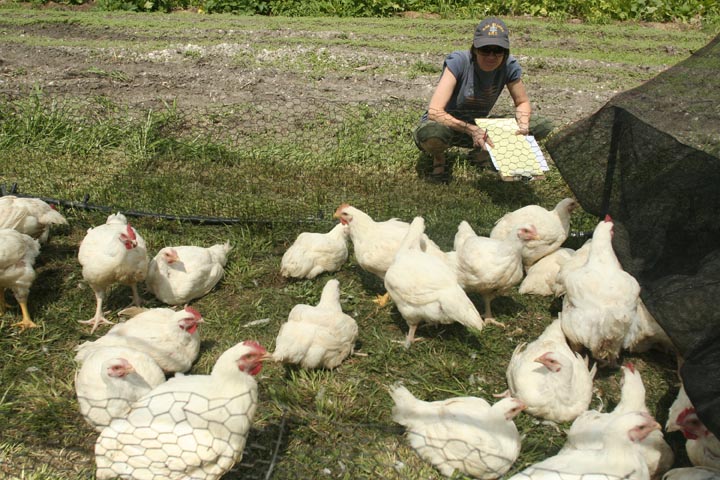When you go to the Farmers’ Market, you trust the food you’re buying because you buy it straight from the farmer. You know where it came from, how it was grown, who picked it, and you are able to ask questions a grocery store clerk might not be able to answer. With the Island Grown Initiative’s (IGI) poultry mobile processing unit, knowing where your food comes from has taken on a new meaning for Vineyarders — they are now able to buy Island-raised chickens in the market.
Morning Glory Farm, North Tabor Farm, Whiting Farm, Cleveland Farm, Flat Point Farm, the Good Farm and Northern Pines Farm are now part of IGI’s pilot program that allows farms to raise chickens, use the IGI mobile processing unit, and commercially sell whole chickens to customers.
The conversation about poultry processing began five years ago when IGI was first founded. “There wasn’t really a ‘before’ in terms of a permanent facility,” IGI executive director Ali Berlow said. “We learned [from farmers] the issues were housing for labor, access to land, and slaughter.”
She said Island housing groups were taking care of the housing issue, there was no money available yet to discuss the land issue, but something could be done about the need for a slaughter facility. “Many people start with chickens because of backyard farming or because it’s an easy point of entry for a farmer,” Mrs. Berlow said.
The solution came in the form of a mobile processing unit that can go from farm to farm, providing a scalder, plucker and evisceration table, and a highly skilled crew to carry out the entire process. The entire unit sits on a five-by-ten trailer that can be pulled with a pickup truck.
Jefferson Munroe is the head of the chicken crew, and he raises his own chickens at the Good Farm. “Because it’s an actual person doing the killing we can assure the birds are dead when they go through other processes,” Mr. Munroe said. “Because it’s a skilled crew and we’ve killed a large number of birds, we know how to do it quickly.”
As a result of the trailer and new permit program, poultry production has increased threefold in the past three years. Compared with 200 birds processed from Island farms in the first year, IGI expects to process 5,000 chickens this year. “We set up the pricing in such a way that we hope it reflects that we’re trying to eliminate the idea of pure speed,” Mrs. Berlow said, adding: “We try to set a wage that’s fair and reflective of what this is and that these are skilled jobs.” Six new part-time jobs, in fact.
The farmer pays IGI a rental fee for the trailer; Mr. Munroe identifies who will make up the crew, and then the farmer pays the crew directly, setting up a fee schedule depending on the number of birds.
“Prior to a visit on a farm for the chicken crew, we encourage the farmer to come and see it,” Mrs. Berlow said. “It takes a lot of work to have this thing arrive. You need wood chips, water, hoses, potable water testing, ice and refrigeration has to be ready. The site must be away from any wells or streams and have good drainage.”
Mr. Munroe and his crew unload the trailer with the equipment under a tent, and set up barriers between the kill floor and evisceration area.
“When it comes to processing chickens there are a number of different stress points,” Mr. Munroe said explaining how they kill the chickens humanely. The first stress point comes from the time the chicken is moved from its coop to the processing location. “That could be hours if not days inasmuch as farmers will drive chickens to a processing plant. Then they’re pulled in a conveyor belt in shackles,” Mr. Munroe said. “In comparison most of the birds we process are held for a very short period of time . . . we kill our first bird within 15 minutes [of setting up].”
After the bird goes through the scalder and plucker, they go the evisceration table where Mr. Munroe and his crew clean up the chicken and make it ready for the oven.
“The biggest challenge is probably keeping a level of compassion for chickens,” Mr. Munroe said. “While it is a job and after a while there’s a certain monotony to what goes on, you are trying to treat each animal with a level of respect. It’s probably one of the more difficult things to do.”
Organizing crew, sites, and formalizing the process is a challenge, but the response from the farmers has been overwhelming. “Most of the farmers are extremely appreciative of the food we process,” Mr. Munroe said. “When I sell people chickens, they’re inevitably very happy with it, so that offsets [the emotions] a bit,” he said, adding:
“While the new regulations are more arduous compared to what used to be the case, all of the farmers are appreciative of the fact of seeing it in action
“This makes sense, it’s reasonable what we’re doing,” he concluded.
“[Mobile processing] has enabled us to grow chicken, which we had wanted to do for a long time but couldn’t economically slaughter them ourselves; we weren’t fast enough at it,” said Jim Athearn at Morning Glory Farm. “Since we’ve been doing it we’ve had 500 chickens a year; we slaughter two times a week, and we’ll do more if demand picks up.”
This past weekend, Rebecca Miller and Matthew Dix welcomed the chicken crew to their North Tabor Farm for the first slaughter of the year. “This is only the second time we’ve done it but we’ve already ordered more chickens,” Ms. Miller said. “My kids are involved in it too and all the farm workers are coming to watch. People are wanting to know where their food is coming from.”
North Tabor sells chicken for $5 a pound, pre-ordered at the stand on North Road. “They’re being frozen tonight and people are coming to pick them up tomorrow,” Ms. Miller said.
The state Department of Public Health, the Department of Environmental Protection and the Department of Agriculture all have been cleared. After paying a $250 fee to the state, IGI’s permit allows farmers to sell to markets and restaurants; work is under way to secure permission to sell to grocery stores.
“This is the most highly subsidized local piece of infrastructure because the state has been trying to make this work,” Mrs. Berlow said. “You end up with a whole frozen bird . . . there’s less instant gratification because you’re not getting a boneless, skinless chicken breast.”
Mrs. Berlow and IGI also are involved in educating farmers and consumers through poultry workshops. “We want to create mentoring relationships and create information where farmers who have never raised chickens on a scale like this can talk to other farmers that have, or backyard farmers can ask other farmers’ advice,” she said, adding:
“The game changed in June with the permit. Now how the business aspect rolls out is unknown at this point. Will they create a cooperative? We’ll see. Will somebody else come in and say how we should market it? We’ll find out.”
The next phase is figuring out a slaughter process on-Island for four-legged animals; IGI a grant to study the issue. “Having learned our chops and got an experience with the poultry program, we’re in a place where we can go into the next phase,” Mrs. Berlow said.
But IGI is also concentrating on making sure commercial farmers and backyard growers are comfortable with the poultry process and are conducting it safely and cleanly.
“Any time you’re putting food into the system, safety and security are nonnegotiable,” Mrs. Berlow said. “The end game was always to get certified so the farmer has the most opportunities and diversity to bring to market.”
This column is meant to reflect all aspects of agriculture and farm life on the Vineyard. Remy Tumin may be contacted at 508-627-4311, extension 116, or e-mail her at rtumin@mvgazette.com.






Comments
Comment policy »